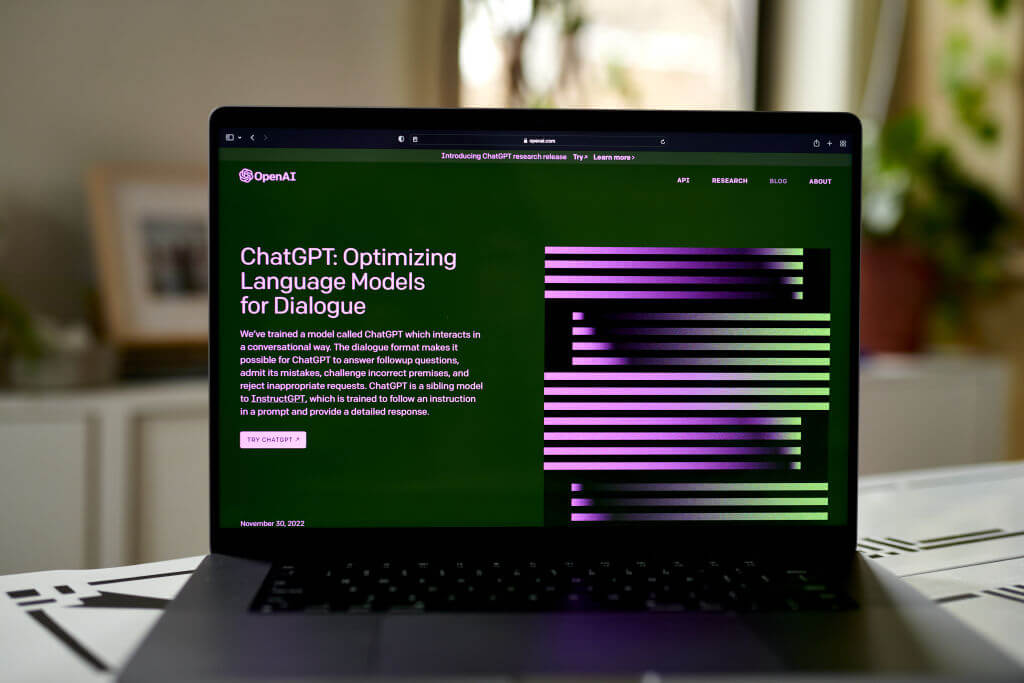The rise of the robo-rabbi? A spiritual leader turned to ChatGPT to pen a recent sermon
Rabbi Joshua Franklin says computers lack the soul necessary to connect with congregations

Rabbis belonging to the Skverer sect of Hasidic Judaism have banned the use of AI like ChatGPT, saying it poses a “terrible danger.” Photo by Gabby Jones/Bloomberg via Getty Images
The spiritual gap between humans and machines has gotten slightly smaller as a New York rabbi has turned to an unconventional source for help writing a recent sermon: an artificial intelligence chatbot.
In an address to the Jewish Center of the Hamptons congregation, a video of which was uploaded to Vimeo on Jan. 1, Rabbi Joshua Franklin warned that his speech was plagiarized and challenged the audience to guess who wrote it.
Franklin then launched into thoughtful oration on that week’s parsha, which included a description of Joseph’s forgiveness and embrace of his brothers and eventual saving of the Israelites. The passage was a launching point for discussing the importance of making ourselves vulnerable to others, including references to the work of bestselling author Brené Brown.
After concluding, Franklin revealed to gasps that he had fed a series of prompts to ChatGPT, an open-source artificial intelligence tool designed to interact in a way typical to human conversation. Since its launch, users have challenged the bot to do tasks like write songs in the style of Nick Cave, write a children’s book and create a Hanukkah movie script. Franklin told the Forward that it seemed logical to see how the tool would fare at sermonizing. While there have been robot priests, his sermon is likely one of the first to be written entirely by a machine.
“The fascinating thing is that it can really synthesize ideas as well,” he said. “I discovered that I can say something like, ‘Tell me about how this particular parsha relates to intimacy,’ which was the basis for the sermon that I gave, and it was able to synthesize how the parsha did relate to intimacy, which was fascinating and scary, both at the same time.”
While Franklin gave the AI credit for synthesizing information in an understandable way, he said there were certain limitations, namely that it lacks nefesh, a Hebrew word often translated to mean “a soul.” The emergence of AI that is increasingly difficult to discern from human output has raised ethical questions in areas like academia, where some universities are already taking steps to prevent its use for cheating.
But Franklin dismissed the idea that a computer can ever convey the sense of connection and spiritual understanding necessary for his job.
“The biggest thing that’s lacking is the ability to really understand what people need to hear,” he said, noting that AI also can’t account for body language, vocal inflection or the other ways that a rabbi can connect to his congregation.
While some rabbis might be tempted to use the program instead of writing their own sermons, Franklin thinks it’s more likely that his colleagues will turn to tools like ChatGPT to help with research and search for inspiration, given the tool’s ability to sift through enormous amounts of data to find the most relevant bits. To Franklin, the real question is: “What do we do with that information?”
“I really do think that were someone to get their Jewish content exclusively through ChatGPT, there would be an X-factor lacking. The human soul, the spirituality, the love, the compassion, all of that would be lacking. And I think they would be doing themselves a disservice to learn Judaism exclusively from artificial intelligence.”
Editor’s note: This version of the story corrects the spelling of Vimeo and links to the video.
















